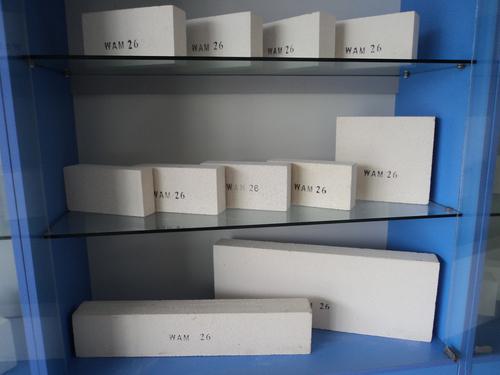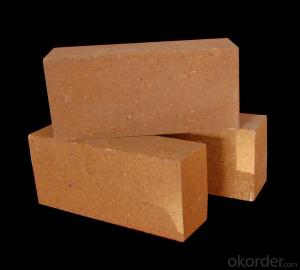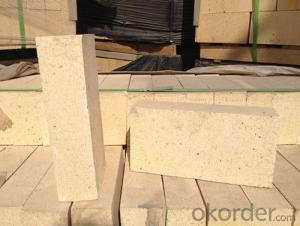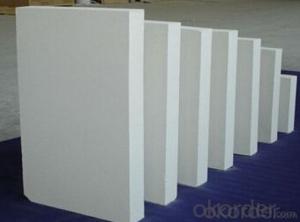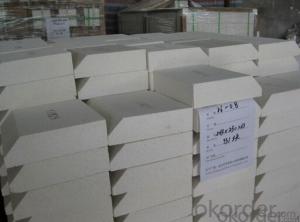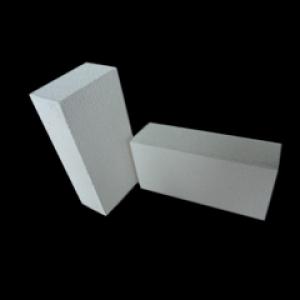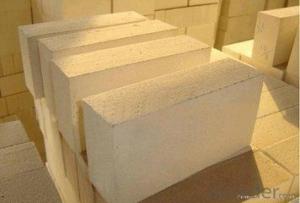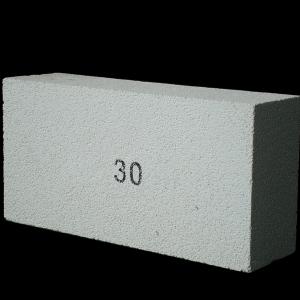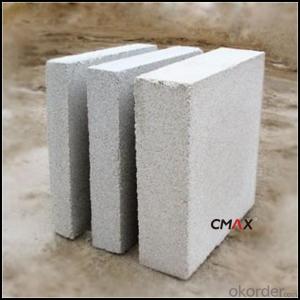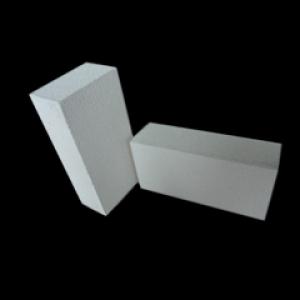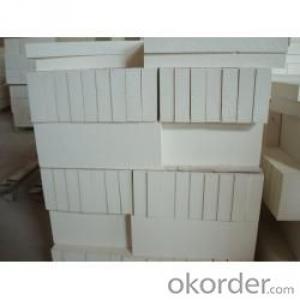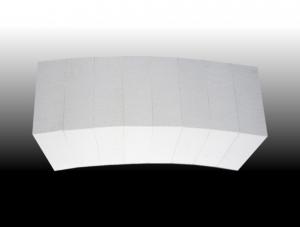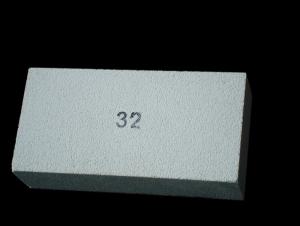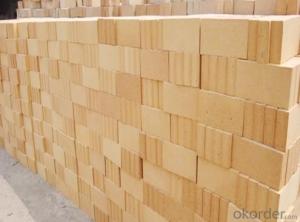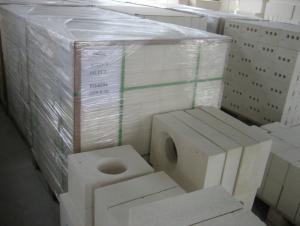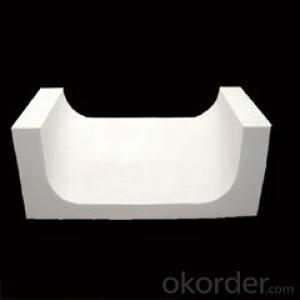High-Quality Insulating Fire Brick
- Loading Port:
- China Main Port
- Payment Terms:
- TT OR LC
- Min Order Qty:
- -
- Supply Capability:
- -
OKorder Service Pledge
Quality Product, Order Online Tracking, Timely Delivery
OKorder Financial Service
Credit Rating, Credit Services, Credit Purchasing
You Might Also Like
General Information
CMAX insulating firebricks are classified under temperature between 1300℃ to 1700℃, manufactured from high purity alumina clay.
Feature
Light weight and low thermal conductivity
Low heat storage
Low iron and impurities
High thermal shock resistance
Application
CMAX insulating firebricks can be used as a hot face lining directly exposed to the heat or as a backup insulation layer in iron and steel mills, non-ferrous foundries, petrochemical, ceramic, glass.
- Q: Can insulating fire bricks be used in the construction of glassware production furnaces?
- Yes, insulating fire bricks can be used in the construction of glassware production furnaces. These bricks have excellent thermal insulation properties and can withstand high temperatures, making them ideal for creating a well-insulated and efficient furnace for glass production.
- Q: Can insulating fire bricks be used in the construction of smelting ovens?
- Yes, insulating fire bricks can be used in the construction of smelting ovens. Insulating fire bricks are designed to have low thermal conductivity, which means they are excellent at retaining heat. This property makes them ideal for applications where high temperatures need to be maintained, such as smelting ovens. Smelting ovens are used to melt and refine various metals and minerals. These processes involve extremely high temperatures, and it is crucial to minimize heat loss to ensure efficient and effective smelting. Insulating fire bricks can help achieve this goal by providing excellent insulation and reducing heat loss. Insulating fire bricks are made from lightweight materials, such as ceramic fibers or expanded clay, which have high insulating properties. They are capable of withstanding temperatures up to 3000°F (1650°C), making them suitable for the extreme heat generated in smelting ovens. Additionally, insulating fire bricks are resistant to thermal shock, meaning they can withstand rapid temperature changes without cracking or breaking. This is essential in smelting processes, which often involve heating and cooling cycles. Furthermore, insulating fire bricks are easy to work with and can be cut or shaped to fit specific dimensions or designs. This flexibility makes them highly adaptable for constructing smelting ovens of various shapes and sizes. In summary, insulating fire bricks are an excellent choice for the construction of smelting ovens due to their low thermal conductivity, high temperature resistance, thermal shock resistance, and ease of customization. They can help maintain high temperatures, reduce heat loss, and ensure efficient smelting processes.
- Q: Do insulating fire bricks have low thermal conductivity?
- Yes, insulating fire bricks have low thermal conductivity. These bricks are specifically designed to minimize heat loss and provide excellent insulation properties. The low thermal conductivity of insulating fire bricks is due to their composition, which typically includes lightweight materials such as clay, silica, and alumina. These materials have low thermal conductivity, meaning they are not efficient at transferring heat. As a result, insulating fire bricks are highly effective at reducing heat transfer and maintaining high temperatures within a structure. This makes them ideal for applications that require insulation against high temperatures, such as in kilns, furnaces, and fireplaces.
- Q: Do insulating fire bricks require any special insulation blankets or jackets?
- Insulating fire bricks (IFBs) are designed to have excellent insulating properties, so they generally do not require any special insulation blankets or jackets. However, depending on the specific application and environment, additional insulation may be needed. If the IFBs are exposed to high temperatures or extreme thermal conditions, it may be beneficial to use insulation blankets or jackets to further enhance their insulation capabilities and protect them from damage. These additional insulation materials can help reduce heat loss, increase energy efficiency, and extend the lifespan of the IFBs. Therefore, while not always necessary, it is worth considering using insulation blankets or jackets in certain situations to optimize the performance of insulating fire bricks.
- Q: Can insulating fire bricks be used in the construction of hot blast stoves?
- Yes, insulating fire bricks can be used in the construction of hot blast stoves. Insulating fire bricks are designed to have low thermal conductivity, making them effective at reducing heat loss. Hot blast stoves require high temperatures to be maintained for efficient operation, and insulating fire bricks can help in achieving this by minimizing heat transfer to the outer surface of the stove. These bricks also have good insulation properties, which help to conserve energy and improve the overall efficiency of the stove. Additionally, insulating fire bricks are resistant to thermal shock, which is important in hot blast stove applications where frequent temperature fluctuations occur.
- Q: Can insulating fire bricks be used in the construction of coke ovens?
- Yes, insulating fire bricks can be used in the construction of coke ovens. Insulating fire bricks are specially designed to withstand high temperatures and provide excellent thermal insulation. Coke ovens operate at extremely high temperatures, typically around 2000 degrees Fahrenheit, and require materials that can withstand these conditions. Insulating fire bricks have low thermal conductivity, which means they can effectively prevent heat transfer between the oven's interior and exterior. This helps to maintain the high temperatures required for the carbonization of coal in the coke oven, while also minimizing heat loss. Furthermore, insulating fire bricks are lightweight and have high strength, making them ideal for use in the construction of coke ovens. Their lightweight nature allows for easier installation and reduces the overall weight of the structure. Their high strength ensures that they can withstand the harsh operating conditions of the coke oven without cracking or crumbling. In summary, insulating fire bricks are a suitable choice for the construction of coke ovens due to their ability to withstand high temperatures, provide thermal insulation, and offer durability.
- Q: Can insulating fire bricks be used for insulation in glass manufacturing?
- Yes, insulating fire bricks can be used for insulation in glass manufacturing. Insulating fire bricks offer high-temperature resistance and low thermal conductivity, making them suitable for insulation and maintaining consistent temperatures during glass manufacturing processes.
- Q: Are insulating fire bricks resistant to fire damage?
- Yes, insulating fire bricks are specifically designed to be resistant to fire damage. They are made from special refractory materials that can withstand extremely high temperatures without deforming or losing their insulating properties. Insulating fire bricks have a high melting point and low thermal conductivity, which allows them to effectively insulate against heat transfer and protect against fire damage. They are commonly used in applications where high temperatures and fire exposure are expected, such as in furnaces, kilns, fireplaces, and industrial processes. Overall, insulating fire bricks are reliable and durable materials that provide excellent protection against fire damage.
- Q: Does the building with the exterior wall thermal insulation brick require adding an angle steel bracket in the middle of the brick?
- There is no mandatory requirement, but the thermal insulation system should use expansion bolts to do the pullout test, and the exterior wall tiles also need pullout tests.
- Q: Can insulating fire bricks be used in the construction of kilns?
- Yes, insulating fire bricks can be used in the construction of kilns. Insulating fire bricks are designed to have a high insulating value, which means they can withstand high temperatures while minimizing heat loss. This makes them ideal for kiln construction, as they help to maintain and regulate the desired temperature within the kiln. Additionally, insulating fire bricks are lightweight and easy to handle, making them convenient for use in kiln construction. They are also resistant to thermal shock, which is important in kilns where rapid temperature changes may occur. Overall, insulating fire bricks are a popular choice for kiln construction due to their insulating properties, durability, and ease of use.
Send your message to us
High-Quality Insulating Fire Brick
- Loading Port:
- China Main Port
- Payment Terms:
- TT OR LC
- Min Order Qty:
- -
- Supply Capability:
- -
OKorder Service Pledge
Quality Product, Order Online Tracking, Timely Delivery
OKorder Financial Service
Credit Rating, Credit Services, Credit Purchasing
Similar products
Hot products
Hot Searches
Related keywords

